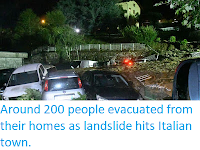The city of Venice in northern Italy suffered its second worst flooding since records began on Tuesday 12 November 2019, with waters reaching 1.87 m above average levels at high tide, a level surpassed only by the flooding of 1966, when the waters reached 1.92 m above average. The flooding is thought tohave caused hundreds of millions of euros of damage to the historic city, as well as causing two fatalities. Both of the known deaths associated with the flood occured on the island of Pellestrina, which forms part of the barrier between the Venetial Lagoon and the Adriatic Sea; one of the fatalities was reportedly due to a man beong electricuted while trying to start a pump in his flooded house, the cause of the other has yet to be disclosed.
Flooding in St Marks Square, Venice, on Tuesday 12 November 2019. /AFP/Getty Images.
The flooding was caused by a combination of a spring tide, in which the Sun and Moon are aligned either on the same side of the Earth or directly oposite (as was the case this week), leading to high tidal waters, and a storm surge caused by a low pressure system over the Mediterranean. The low pressure above areas of sea causes water to rise there by ~1
cm for every millibar drop in pressure, leading to a storm surge that
can overwhelm low-lying coastal areas.
Animation showing how the alignment of the Sun and Moon causes higher 'spring' tides. NOAA.
See also...
Follow Sciency Thoughts on Facebook.








